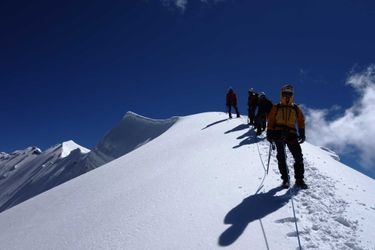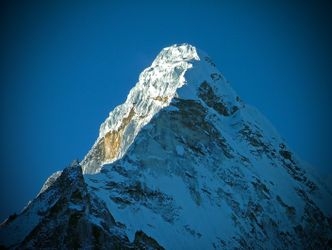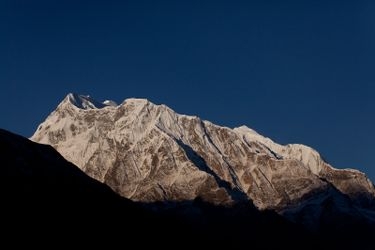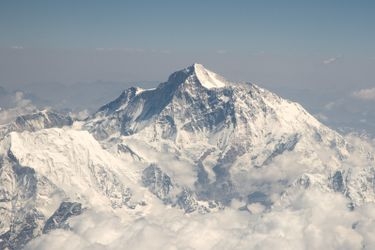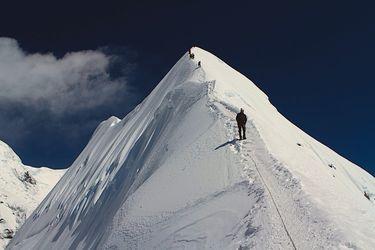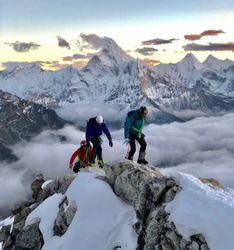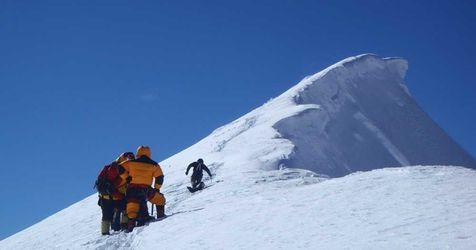Why climb in Nepal
Nepal is the ultimate destination for mountaineers, offering some of the highest and most iconic peaks in the world, including Mount Everest. It’s a country where mountaineering history runs deep, and the Himalayan landscape is both breathtaking and challenging. Climbing in Nepal provides the chance to experience high-altitude adventure in the world’s most dramatic mountain ranges, rich cultural encounters with Sherpa communities, and access to well-established trekking routes. Whether you're a beginner looking for your first 6000-meter peak or a seasoned mountaineer seeking a new challenge, Nepal will captivate you and leave a permanent mark in your heart.
Pretty much everything is arranged from the capital Kathmandu - with one neighborhood 'Thamel' the place you'll find all expedition agencies and gear shops. It's in my opinion one of the best places to buy gear in the world. They have real equipment at exception prices - with a huge range. There's also loads of fake stuff, and everything in between.
When to climb in Nepal
- March to May
- September to November
The best seasons for climbing in Nepal are Spring (March-May) and Autumn (September-November).
-
Spring: The weather is warmer, and the days are longer, making it ideal for summit attempts. However, visibility may be slightly lower due to dust in the air.
-
Autumn: Considered the best time for climbing due to crystal-clear skies and cooler temperatures. The monsoon rains settle the dust, providing clearer views and making the routes less slippery.
Avoid climbing during the summer monsoon (June-August) due to heavy rains, unstable slopes, and limited visibility. Winter (December-February) is extremely cold, especially at higher altitudes, and is only recommended for the most experienced climbers.
Where to climb in Nepal
-
Everest Region (Khumbu): Home to Mount Everest, the Khumbu region is the most popular for trekking and climbing. In addition to Everest, peaks like Ama Dablam, Island Peak, and Lobuche East are excellent options for climbers of varying experience levels. The area is well-equipped with tea houses, guides, and gear shops.
-
Annapurna Region: Known for its dramatic landscape and relatively easier access compared to the Everest region, the Annapurna area offers peaks like Annapurna I, Gangapurna, and Pisang Peak. It's a great choice for climbers seeking technical challenges and scenic beauty.
-
Langtang Region: Close to Kathmandu, the Langtang region offers a less crowded but equally stunning trekking and climbing experience. Peaks like Langtang Lirung and Yala Peak are accessible for those looking to avoid the more touristed regions.
-
Rolwaling and Dolpo: These regions are more remote and see fewer climbers. Peaks like Gaurishankar and the Rolwaling Range offer technical and isolated climbs for those seeking adventure off the beaten path.
Climbs in Nepal
Most popular
The classic climbs in Nepal:
Lesser known
Escape the crowds and get of the beaten path in Nepal with these climbs:
Most difficult
If you want to challenge yourself, consider these climbs in Nepal:
All climbs in Nepal
Ama Dablam, located in Nepal, stands as a distinctive beacon for mountaineers seeking a challenging climb. Rising to an elevation of 6,812 meters, this peak is renowned not only for its aesthetic beauty but also for the technical challenges it presents. The southwest ridge, known as the normal route, offers an exhilarating climb with a mix of rock, ice, and snow. The expedition demands a high degree of skill, particularly in ice and mixed climbing, making it a sought-after ascent for experienced climbers. The name "Ama Dablam" translates to "Mother's Necklace," reflecting the hanging glacier that resembles a traditional double-pendant worn by Sherpa women. The climb is a testament to precision and perseverance, where each section presents its unique set of challenges.
As you ascend, you'll encounter the notorious Dablam, an overhanging ice cliff that tests even the most seasoned climbers. The exposure in this section is significant, demanding careful judgment and steady nerves. The route to the summit involves negotiating intricate seracs and traversing steep pitches. The views from the summit are nothing short of spectacular, offering panoramic vistas of the Himalayas that few get to witness firsthand. The high-altitude conditions can be harsh, with rapid weather changes that demand respect and readiness from all climbers. It’s a mountain that rewards meticulous preparation and the ability to adapt to the mountain's rhythm.
Despite its allure, Ama Dablam should not be underestimated. The mountain's popularity has grown, and with it, the number of expedition teams attempting to conquer its heights. Currently, there are 45 guides offering expeditions to Ama Dablam, providing ample opportunities for those ready to take on its challenges. Each ascent is a blend of strategy, skill, and determination, calling for a deep respect for the mountain's formidable presence.
Chulu East is a noteworthy peak in the Annapurna region of Nepal, standing at an impressive height of approximately 6,584 meters. This mountain is a popular choice among mountaineers due to its challenging yet achievable routes, which offer an ideal balance for those looking to step up from trekking peaks to more demanding climbs. The ascent typically begins from the village of Manang, providing a gradual acclimatization as you progress towards the higher altitudes. The initial approach involves navigating through diverse terrain, ranging from lush forests to rocky outcrops, setting the stage for the more technical sections ahead.
The climb itself is characterized by a mixture of rock and ice, with some sections requiring proficiency in technical skills. The north-east ridge is the usual route taken by climbers, which demands careful planning and execution. The route involves negotiating snow slopes and a glacier, where crevasse navigation becomes crucial. As you climb higher, the thinner air and colder temperatures present additional challenges, but the rewards of standing atop Chulu East are immense. The panoramic views of the Annapurna and Dhaulagiri ranges are a testament to the effort put into the climb, offering a unique perspective of this part of the Himalayas.
Weather and conditions play a significant role in the success of the climb, with the ideal times being the pre-monsoon (spring) and post-monsoon (autumn) seasons. These periods offer relatively stable weather, though sudden changes can still occur, requiring climbers to be adaptable and prepared. It's important to have a good understanding of the conditions and be ready for potential avalanche risks and rapid weather changes. There are currently 45 guides that offer expeditions up Chulu East, providing ample options for those seeking organized support for their ascent.
Island Peak, or Imja Tse, stands at an altitude of 6,189 meters in the heart of the Himalayas. It's a favored choice for mountaineers who have set their sights on higher summits but want to hone their skills on a challenging yet accessible peak. The approach to Island Peak is not just about the climb itself but offers a captivating journey through the Khumbu region, providing a taste of the majestic landscapes and the unique culture of Nepal. The ascent involves a combination of glacier travel, a steep headwall, and a thrilling summit ridge that demands technical ability and acclimatization.
The climb of Island Peak is often underestimated due to its relatively modest elevation compared to other Himalayan giants. However, it presents its own set of challenges. The route is typically approached via the south ridge, starting with a trek to the base camp. As you progress, you'll encounter crevassed glaciers and a headwall that requires the use of fixed ropes. The final push to the summit involves a narrow ridge that rewards climbers with breathtaking views of Lhotse, Makalu, and Baruntse. Conditions can be harsh, with unpredictable weather and extreme cold at higher altitudes, so preparation and experience are key.
Island Peak is particularly popular due to its accessibility and the opportunity it provides for mountaineers to test their skills. While it's achievable for those with some climbing experience, the peak should not be taken lightly. It's often used as a precursor to more demanding expeditions, offering a realistic taste of what higher altitude climbs entail. The mountain sees a fair number of guided expeditions, with 57 guides offering climbs, ensuring that those seeking support can find experienced partners to accompany them on their journey.
Lobuche East, located in Nepal, stands at an impressive height of 6,119 meters. It's a mountain that offers a challenging yet rewarding climb for those looking to push their limits. The ascent is typically approached from the south ridge, which requires a mix of technical skills due to its steep and icy sections. The route is known for its breathtaking views of the surrounding peaks, including Ama Dablam and Pumori, making it a favorite among climbers seeking both adventure and scenic beauty.
The difficulty of Lobuche East should not be underestimated. Its summit ridge is sharp and requires careful navigation, especially in adverse weather conditions. The climb demands proficiency in the use of crampons and ice axes, as well as experience with fixed ropes. The high altitude and exposure can be taxing, even for seasoned climbers. It's crucial to be prepared for sudden weather changes and to acclimatize appropriately, as altitude sickness is a common concern.
When planning an expedition to Lobuche East, it's worth noting that there are numerous logistical considerations, from obtaining permits to organizing gear and supplies. Fortunately, there are 39 guides who offer expeditions to this remarkable peak. Their expertise can be invaluable, ensuring both safety and a successful summit attempt.
Mera Peak, standing proudly in the Himalayas of Nepal, is a popular destination for those seeking to tackle a high-altitude summit. At an elevation of around 6,476 meters (21,247 feet), it is often considered one of the more accessible peaks above 6,000 meters, offering a challenging yet rewarding climb. The ascent primarily involves non-technical terrain, characterized by snow slopes and straightforward glacier travel. However, the altitude and the weather conditions can present significant hurdles, demanding a solid level of acclimatization and fitness from any climber.
The typical approach to Mera Peak begins with a trek through the lush and scenic Hinku Valley, which not only serves as a picturesque introduction to the journey but also provides valuable acclimatization. The climb itself is often tackled via the Mera La pass, leading to a high camp positioned near the Mera Glacier. From there, the summit push involves navigating crevassed terrain and dealing with potentially freezing temperatures and strong winds. The final ascent is steep, and although it doesn't require technical climbing skills, the thin air at such elevations is a test of endurance and mental fortitude.
Reaching the summit of Mera Peak offers a stunning panorama, with views of some of the world's highest peaks, including Everest, Lhotse, and Makalu. This landscape is a testament to the majestic beauty of the Himalayas and a fitting reward for the effort involved in the climb. The mountain sees a considerable number of climbers each year, with around 56 guides offering expeditions to its summit, making it a well-organized yet challenging endeavor for any mountaineer looking to push their limits.
Pisang Peak, nestled in the Annapurna region of Nepal, stands at an impressive 6,091 meters. Known for its relatively accessible climbing route, it offers an enticing challenge to those who've already cut their teeth on other peaks. The approach is typically made via the village of Pisang, which provides a scenic backdrop for acclimatization. The climb itself presents a blend of rock and ice, demanding both technical skill and adaptability. Ascending Pisang Peak is not just about reaching the summit; it's about navigating its unique terrain and variable conditions with precision and care.
For those considering the climb, expect a route that alternates between moderate slopes and steeper sections requiring fixed ropes. The ascent is often approached from the southwest ridge, where climbers find the challenge of mixed climbing rewarding. Weather conditions can be unpredictable, with winds and sudden snowfalls adding to the complexity. The peak demands respect for its potential hazards, such as crevasses and avalanche-prone areas. Despite these challenges, the view from the summit rewards climbers with panoramic vistas of the Annapurna and Manaslu ranges, a sight that is hard to rival.
It's worth noting that Pisang Peak, while categorized as a trekking peak, should not be underestimated. Climbers need a good understanding of alpine techniques and strong physical conditioning. The mountain's popularity means it's well-frequented, but it also offers solitude and a sense of wilderness that's becoming rare in the more commercialized climbing spots. For those ready to take on its challenges, a total of 53 guides are available to support your expedition, though each climber must be prepared to rely on their skill and judgment when tackling this formidable peak.
Himlung Himal, located in the Nepal section of the Himalayas, stands tall at an impressive 7,126 meters. This peak, though less frequented than its famed neighbors like Annapurna or Manaslu, offers a unique and rewarding climb for those seeking a less commercialized adventure. The ascent is mostly non-technical, but don't let that fool you into thinking it's a walk in the park. The climb demands respect, given its altitude and the potential for unpredictable weather conditions. Seasoned climbers will appreciate the relatively untouched nature of the route, which provides a sense of solitude and connection to the raw beauty of the mountains.
Most expeditions to Himlung Himal begin at the village of Phu, following a scenic trek that serves as a perfect acclimatization period. The approach is a harmonious blend of cultural immersion and wilderness trekking, setting the stage for the challenges ahead. The mountain itself offers a series of camps before the final push to the summit, which is usually attempted from Camp 3. Expect long days on the ice and snow, with crevasse navigation and steep slopes that test your stamina and resolve. The rewards are equally great, with panoramic views at the summit that few have had the privilege to witness.
Climbing Himlung Himal is a commitment that requires careful planning and a willingness to embrace the unknown. The conditions can range from straightforward ice and snow ascents to more challenging mixed terrain, depending on the season and weather patterns. It's an ideal expedition for experienced climbers looking to push their limits in a less crowded environment. While the mountain is gaining popularity, it still retains an air of exclusivity. There are currently 46 guides offering expeditions to this remarkable peak, providing ample opportunity for those ready to undertake this adventure.
Dhampus Peak, nestled in the heart of the Dhaulagiri range in Nepal, stands at an impressive 6,012 meters above sea level. This peak offers a non-technical climb that attracts seasoned mountaineers looking for a less crowded ascent with rewarding views. The approach to the mountain involves traversing through the magnificent Kali Gandaki valley, offering glimpses of the diverse landscapes of the Annapurna and Dhaulagiri ranges. The climb itself is straightforward, with the main challenge being its altitude. The ascent demands careful acclimatization, but the route does not require advanced technical skills, making it an appealing choice for those who have experience in high-altitude trekking.
The conditions on Dhampus Peak are typical of the Himalayan region, with weather patterns that can change rapidly. Climbers should be prepared for cold temperatures and the possibility of snow, particularly during the early or late parts of the climbing season. The best time to attempt this peak is during the pre-monsoon (April to June) and post-monsoon (September to November) periods when the weather is most stable. The final ascent involves negotiating a snow-covered ridge that offers a panoramic vista of the surrounding peaks, including the towering Dhaulagiri and the distant Annapurnas. This ridge walk is the highlight of the climb, providing a sense of solitude and a connection to the vastness of the Himalayas.
For those considering an expedition to Dhampus Peak, you'll find that the mountain is served by around 30 guides who offer their expertise to help you navigate its slopes. These guides can assist with logistics, ensuring a safe and enriching experience. The mountain’s relatively accessible nature combined with its stunning scenery makes it a worthy addition to any mountaineer's itinerary in Nepal.
Cholatse, located in the Khumbu region of Nepal, stands as a formidable challenge at an elevation of 6,440 meters. The mountain, also known as Jobo Lhaptshan, is part of the Mahalangur range in the Himalayas and offers a climb that is not for the faint-hearted. Its steep, icy facets and complex ridges require technical proficiency and a well-prepared team. The north face, in particular, is renowned for its demanding nature, with mixed climbing conditions that can test even seasoned alpinists. The mountain offers a rewarding ascent for those looking to push their limits on less-traveled paths.
The approach to Cholatse often starts from the village of Dzongla, providing an opportunity to acclimatize and appreciate the rugged beauty of the surrounding peaks. The climb itself involves navigating through intricate seracs, crevasses, and often unpredictable weather conditions. The west face presents a steep and icy ascent, demanding careful route finding and efficient use of technical gear. The summit push is usually undertaken in the early hours to take advantage of more stable snow conditions and to avoid afternoon avalanches, a common challenge in this region.
The remoteness and technical demands of Cholatse mean it remains less popular than some of its neighboring giants, but for those with the experience and determination, it offers a unique and exhilarating climb. While the mountain doesn’t see as many ascents as others in the area, it rewards climbers with stunning views of the surrounding peaks, including Ama Dablam and Taboche. For those interested, there are approximately 20 guides offering expeditions to this majestic peak, providing support for those ready to take on the challenge.
Baruntse, standing at an impressive 7,129 meters, is a captivating peak in the Khumbu region of Nepal. Known for its symmetrical beauty, the mountain offers a rewarding climb for mountaineers looking for something off the beaten path. The routes are primarily snow and ice ascents, which makes them perfect for those seeking to hone their technical skills. The West Ridge is the most popular route, providing a direct line to the summit. It's a great warm-up for those eyeing higher peaks in the region, offering challenges without the extreme altitudes of its towering neighbors.
The climb itself is moderately technical, with sections that require adept use of ice axe and crampons. The ascent involves navigating through crevassed glaciers and steep snow slopes, especially as you approach the summit ridge. The summit push demands focus and determination, often with a final steep section that can test your endurance and skills. The weather conditions can be unforgiving, with high winds and sudden snowfalls, making it crucial to have a flexible schedule. The views from the summit, however, reward every ounce of effort, with panoramic vistas of Everest, Lhotse, and Makalu.
Logistics can be a bit tricky due to its remote location. Access typically involves a trek through the scenic Hinku Valley, which itself is a memorable experience. The climbing season generally falls in the pre-monsoon and post-monsoon periods, when conditions are most stable. For those interested in taking on Baruntse, there are a total of 28 guides that offer expeditions, each providing varying levels of support and expertise to aid in your ascent.
Climb difficulties in Nepal
How many of each difficulty grade can you find a route for.
| French Alpine | Difficulty description | Quantity |
|---|---|---|
| F | Easy. Suitable for beginners, minimal technical skills required. | 1 |
| PD | Not very difficult. Some technical skills required, with moderate exposure. | 13 |
| AD | Fairly difficult. Requires good technical skills and experience, with significant exposure. | 10 |
| D | Difficult. Requires advanced technical skills and experience, with high exposure. | 13 |
| TD | Very difficult. Requires very advanced technical skills, experience, and serious commitment. | 3 |
| ED | Extremely difficult. Requires exceptional technical skills, experience, and high commitment. | 0 |
Guides with trips in Nepal
There are 983 guided trips listed for Nepal. Trips range from $580 to $98,000, and average $10,685 per expedition.




